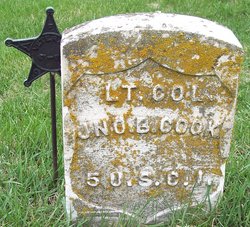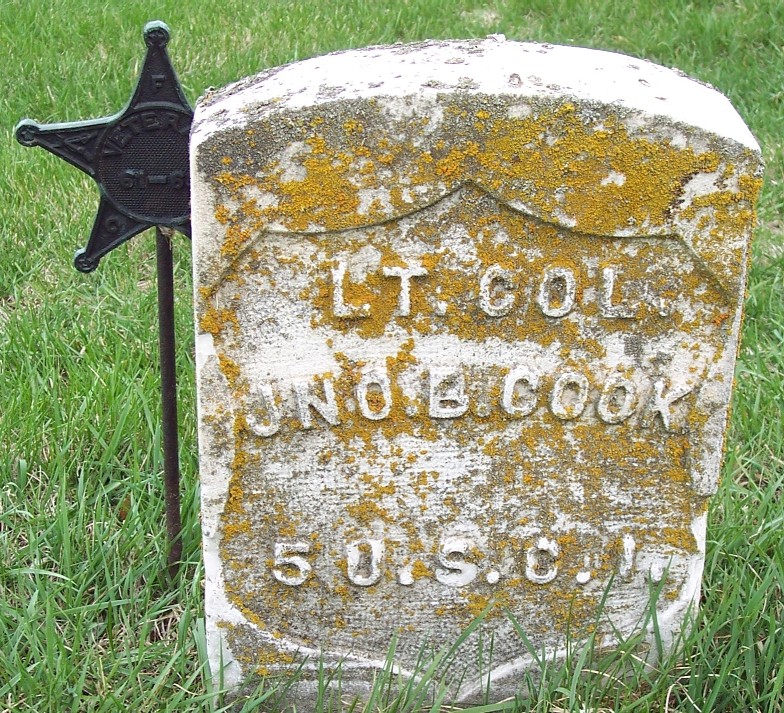John Benajah Cooke was a grain merchant and implement dealer, formerly of Raleigh, N.C. During the Civil War Mr. Cooke was colonel of the Fifth United States colored troops and after the war was state senator for North Carolina.
Oct 17, 1892 - Carroll Sentinel - The remains of Col. J.B. Cooke arrived in the city Sunday on the 2 p.m. train and was taken to his residence by members of the Grand army post at this place. At 4 o'clock a short funeral ceremony was conducted at the home of Rev. Folsum, then the funeral exercise's were placed in the hands of the post. The coffin was taken from the room and placed in front of the building where an opportunity was given to view the remains.
The boys in blue, forty-seven of them, filed by and took a last look at their comrade, then a large crowd of citizens who had met to pay honor to the living and the dead, viewed the remains. Major Mellenvy of Denison, a past commander of the department of Iowa, equal in rank with the deceased, had charge of the ceremonies. J.W. Hatton, W.L. Culburtson, M.L. Niswenger, B.F. Woodward, C.L. Bruner and Wm. Trowbridge acted as pallbearers, followed by the firing squad and those by the post. A large procession of sympathizing friends followed the cortege to the cemetery where the regular grand army ritual ceremonies were performed.
At the conclusion of the exercises a telegram from the warden of the hospital was read stating that the colonel made a dying statement that he came to his death by a gunshot wound received during the war and that he made this statement for the benefit of his heirs. The body was taken back to the city with the intention of holding an autopsy but when they returned they found that one had been held by the authorities of the hospital in Chicago where he died. The body was than taken back to the grave and laid to rest until the final day when the quick and the dead will answer the last great call.
As we looked upon the thin, emaciated remains of the colonel who lay like "a warrior, taking his rest", in a beautiful metallic coffin, with the national emblem wrapped around it and an anchor of pure white flowers resting on the lid, the thought involuntarily came to our mind that was expressed by the colonel in opening a speech made to his comrades at one of the first observances of decoration day ever held in this city, when he said with all that fiery eloquence of his for which he was noted, "That time in passing wreaths, its wrinkles indelibly upon the tablets of our brows." The full force of that statement was apparent to all who saw him yesterday for the last time.
Those who remember the brave, generous, chivalrous colonel cannot help but have a feeling of sadness come over them when they think of his proud military bravery that compelled even his enemies to recognize in him the elements of a noble man, born to command and under more favorable circumstances would have made him one of the foremost men of his city.
We who have followed him through the varying changes of his eventful life for nearly a quarter of a century cannot help but have a warm spot in our recollection for the man we have all respected and personally knew in his earlier days and whose remains were laid to rest under so adverse circumstances. What ever may have been his weakness he possessed a brave, generous heart, which like a mantle of charity will cover a multitiude of errors to which poor, frail humanity at best is heir.
Could we but lay bare the heart and read the motives that impressed him to action, we are of the opinion that no braver, truer or unselfish motives ever swayed the action of man than those that controlled Col. Cooke, whose untimely departure is today unveiled by his relatives and friends with an unalloyed sorrow that comes from the heart.
The particulars of his death are not known yet, other then he had been sick for a couple of weeks, and two days before his death was taken to the hospital at his own request thinking he would be sick for a long time.
The bereaved widow and children have the entire heart-felt sympathy of tho entire community, and all that loving hand could do will be done to aid them in their sad hour of their bereavement.
John Benajah Cooke was a grain merchant and implement dealer, formerly of Raleigh, N.C. During the Civil War Mr. Cooke was colonel of the Fifth United States colored troops and after the war was state senator for North Carolina.
Oct 17, 1892 - Carroll Sentinel - The remains of Col. J.B. Cooke arrived in the city Sunday on the 2 p.m. train and was taken to his residence by members of the Grand army post at this place. At 4 o'clock a short funeral ceremony was conducted at the home of Rev. Folsum, then the funeral exercise's were placed in the hands of the post. The coffin was taken from the room and placed in front of the building where an opportunity was given to view the remains.
The boys in blue, forty-seven of them, filed by and took a last look at their comrade, then a large crowd of citizens who had met to pay honor to the living and the dead, viewed the remains. Major Mellenvy of Denison, a past commander of the department of Iowa, equal in rank with the deceased, had charge of the ceremonies. J.W. Hatton, W.L. Culburtson, M.L. Niswenger, B.F. Woodward, C.L. Bruner and Wm. Trowbridge acted as pallbearers, followed by the firing squad and those by the post. A large procession of sympathizing friends followed the cortege to the cemetery where the regular grand army ritual ceremonies were performed.
At the conclusion of the exercises a telegram from the warden of the hospital was read stating that the colonel made a dying statement that he came to his death by a gunshot wound received during the war and that he made this statement for the benefit of his heirs. The body was taken back to the city with the intention of holding an autopsy but when they returned they found that one had been held by the authorities of the hospital in Chicago where he died. The body was than taken back to the grave and laid to rest until the final day when the quick and the dead will answer the last great call.
As we looked upon the thin, emaciated remains of the colonel who lay like "a warrior, taking his rest", in a beautiful metallic coffin, with the national emblem wrapped around it and an anchor of pure white flowers resting on the lid, the thought involuntarily came to our mind that was expressed by the colonel in opening a speech made to his comrades at one of the first observances of decoration day ever held in this city, when he said with all that fiery eloquence of his for which he was noted, "That time in passing wreaths, its wrinkles indelibly upon the tablets of our brows." The full force of that statement was apparent to all who saw him yesterday for the last time.
Those who remember the brave, generous, chivalrous colonel cannot help but have a feeling of sadness come over them when they think of his proud military bravery that compelled even his enemies to recognize in him the elements of a noble man, born to command and under more favorable circumstances would have made him one of the foremost men of his city.
We who have followed him through the varying changes of his eventful life for nearly a quarter of a century cannot help but have a warm spot in our recollection for the man we have all respected and personally knew in his earlier days and whose remains were laid to rest under so adverse circumstances. What ever may have been his weakness he possessed a brave, generous heart, which like a mantle of charity will cover a multitiude of errors to which poor, frail humanity at best is heir.
Could we but lay bare the heart and read the motives that impressed him to action, we are of the opinion that no braver, truer or unselfish motives ever swayed the action of man than those that controlled Col. Cooke, whose untimely departure is today unveiled by his relatives and friends with an unalloyed sorrow that comes from the heart.
The particulars of his death are not known yet, other then he had been sick for a couple of weeks, and two days before his death was taken to the hospital at his own request thinking he would be sick for a long time.
The bereaved widow and children have the entire heart-felt sympathy of tho entire community, and all that loving hand could do will be done to aid them in their sad hour of their bereavement.
Family Members
Advertisement
Advertisement







